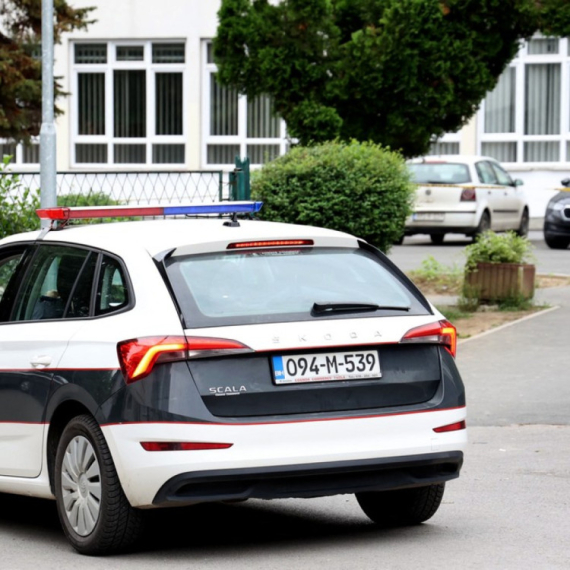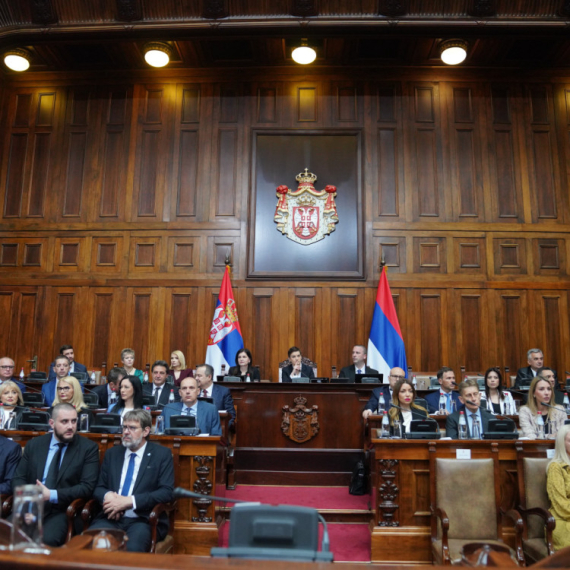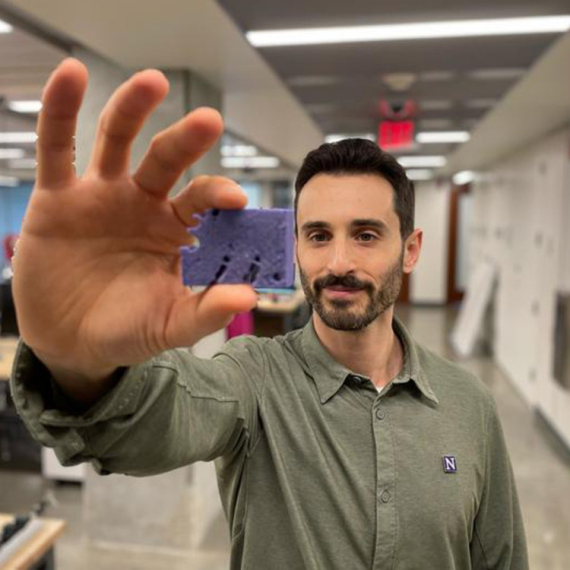Anti-discrimination law by end of April
Interior Minister Ivica Dačić said that a draft law against discrimination will be adopted in parliament by the end of April.
Monday, 09.03.2009.
09:58

Interior Minister Ivica Dacic said that a draft law against discrimination will be adopted in parliament by the end of April. He told a B92 TV talk show last night that the law will be passed, along with all other legislation that parliament needs to approve in order for Serbia to receive a positive report for the white Schengen list. Anti-discrimination law by end of April He said that the Church should not involve itself in politics, but that it has the right to give its opinion. Dacic said that during a telephone meeting of the government last week, he agreed that the draft be pulled from the parliamentary procedures because he thought that there was already an agreement reached, and he denied that any officials of his Socialist Party of Serbia (SPS) have any deals with the Church to vote against the law. “In any case, there is some reason. The reason is probably the fact that all religious communities were asking for certain articles to be debated. And they should be debated, I have nothing against it, but no one discussed it with me. I want to say once more, that was not removed because of the SPS,” Dacic said. “The churches should give their opinion, the Serbian Orthodox Church, Catholic Church and Islamic communities all have the right to give their opinions, this should be discussed in the procedure before adopting a law and I do not see anything wrong with,” Dacic, who is also first deputy premier, added. EU supports proposed law The European Commission supported the Serbian government's efforts regarding the adoption of the Law Against Discrimination, which is one of the conditions for a visa-free regime for Serbian citizens traveling in the EU, while the basis of the temporarily withdrawn proposed law will not be changed. Beta learned this on Sunday from State Secretary in the Ministry of Human and Minority Rights Marko Karadzic, who met with officials from the European Commission Directorate for Justice, Freedom and Security, and discussed the progress which the Serbian authorities had made in carrying out the conditions for Serbia's place on the EU's white Schengen list. According to Karadzic, he explained to his collocutors that the temporary withdrawal of the Law Against Discrimination from the adoption procedure in the Serbian parliament is an event that happens in countries in transition. The proposed law is harmonized with the international conventions signed by Serbia, as well as with European standards, and received a positive assessment from the Council of Europe Venice Committee and civil society experts, Karadzic explained. He made it clear that this is the reason why the basis of the law will remain unchanged, adding that this important legal act should receive full support within a week. European Parliament's Intergroup on Gay and Lesbian Rights said in a statement issued today that it urges the Serbian government to put anti-discrimination law back on the agenda in the Serbian parliament. "In a country which aims to be a member of the European Union it is unacceptable to let minorities suffer discrimination including the discrimination based on sexual orientation", said Michael Cashman, president of the Intergroup. "If the Serbian government is serious about its EU membership aspirations, they will put the law back for the vote in the parliament." "This is also a question about the democracy and rule of law. A country can not be considered democratic if the government does not follow the constitution which clearly states the separation of church and state. This anti-discrimination law has been drafted in an open and fair process where all parties have been involved equally. To stop the law because of the inconsequent last minute intervention by the church is not democratic in any way," concludes Cashman.
Anti-discrimination law by end of April
He said that the Church should not involve itself in politics, but that it has the right to give its opinion.Dačić said that during a telephone meeting of the government last week, he agreed that the draft be pulled from the parliamentary procedures because he thought that there was already an agreement reached, and he denied that any officials of his Socialist Party of Serbia (SPS) have any deals with the Church to vote against the law.
“In any case, there is some reason. The reason is probably the fact that all religious communities were asking for certain articles to be debated. And they should be debated, I have nothing against it, but no one discussed it with me. I want to say once more, that was not removed because of the SPS,” Dačić said.
“The churches should give their opinion, the Serbian Orthodox Church, Catholic Church and Islamic communities all have the right to give their opinions, this should be discussed in the procedure before adopting a law and I do not see anything wrong with,” Dačić, who is also first deputy premier, added.
EU supports proposed law
The European Commission supported the Serbian government's efforts regarding the adoption of the Law Against Discrimination, which is one of the conditions for a visa-free regime for Serbian citizens traveling in the EU, while the basis of the temporarily withdrawn proposed law will not be changed.Beta learned this on Sunday from State Secretary in the Ministry of Human and Minority Rights Marko Karadžić, who met with officials from the European Commission Directorate for Justice, Freedom and Security, and discussed the progress which the Serbian authorities had made in carrying out the conditions for Serbia's place on the EU's white Schengen list.
According to Karadžić, he explained to his collocutors that the temporary withdrawal of the Law Against Discrimination from the adoption procedure in the Serbian parliament is an event that happens in countries in transition.
The proposed law is harmonized with the international conventions signed by Serbia, as well as with European standards, and received a positive assessment from the Council of Europe Venice Committee and civil society experts, Karadžić explained.
He made it clear that this is the reason why the basis of the law will remain unchanged, adding that this important legal act should receive full support within a week.
European Parliament's Intergroup on Gay and Lesbian Rights said in a statement issued today that it urges the Serbian government to put anti-discrimination law back on the agenda in the Serbian parliament.
"In a country which aims to be a member of the European Union it is unacceptable to let minorities suffer discrimination including the discrimination based on sexual orientation", said Michael Cashman, president of the Intergroup.
"If the Serbian government is serious about its EU membership aspirations, they will put the law back for the vote in the parliament."
"This is also a question about the democracy and rule of law. A country can not be considered democratic if the government does not follow the constitution which clearly states the separation of church and state. This anti-discrimination law has been drafted in an open and fair process where all parties have been involved equally. To stop the law because of the inconsequent last minute intervention by the church is not democratic in any way," concludes Cashman.
























































Komentari 1
Pogledaj komentare